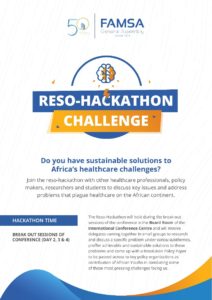The FAMSA general assembly continued earnestly on the 20th of November, 2018 at the International Conference Centre (ICC), Ibadan. The students of the College of Medicine, University of Ibadan, in an attempt to change the course of history as regards the health sector in Africa, inculcated special plenary and breakout sessions into the programmes scheduled for the day 3 of the FAMSA general assembly.
The plenary session scheduled to hold on the day 3 of the FAMSA GA, “Plenary session III” did not hold, but rather the “plenary session II” was held. The plenary session II was titled “Infectious diseases in Africa: Are we really winning?” The plenary session started at about 9.33am with Mr. Subomi Omoleye as the moderator. The first Panelist, Dr Stephen Obaro was invited to give his talk before the interactive session began. He began his talk at about 9.43am.

Dr. Stephen Obaro spoke on the recent Ebola virus outbreak in the Democratic Republic of Congo. He enlightened the delegates and observers present on the virology of the Ebola virus. He concluded his talk by asking the delegates and the observers, who were mostly medical students, to pick interest in infectious diseases, as it is a very dynamic branch of medicine. Dr. Stephen Obaro made it clear that it takes passion to continue to remain in the field of infectious diseases, and as such those who want so much money, as medical doctors should not go into that field of medicine. This erupted laughter among members of the audience. His talk came to an end at 9.58am.
The other members of the panel, Dr. Clement Peter and Dr, Ali Pate, for the “Plenary session II” were introduced and the interactive session began. It was a very enlightening session and several questions were welcomed from the delegates at the end of the session. The delegates and observers were made to go for tea break after the plenary session.
The next plenary session, “Plenary session III”which was titled “The Burden of Non-Communicable Diseases (NCDs): Taking a quantum leap”. The members of the panel were introduced and the interactive session began in earnest. It was an even more interactive session as it seemed like the issues that were raised affected most of the delegates and observers in one way or the other. The delegates and observers were encouraged by one of the panellists to be create consciousness about the NCDs among our families, especially as people in the medical field. At the end of the interactive session, a lot of questions were raised by the delegates and observers and they were duly answered by the members of the panel. The 2 minute video clip of the WHO representative was played again to the delegates and observers, for the sake of those that were not present on the day 2 of the FAMSA GA.The short video clip was interrupted by the supply of power. An apology was duly rendered by the University of Ibadan Medical Student Association (UIMSA) president for the interruption encountered.
The poster break/exhibition which was the next programme in the schedule, was held at the back of the main hall. The delegates were then directed to the gallery, were they had the lunch break. A variety of meals was served at the lunch break.

The breakout sessions, which is also meant to be educating and interacting began after the lunch. Four breakout sessions/workshop were meant to run concurrently. Two breakout sessions were held within the main hall of International Conference Centre.
- The workshop I: The Burden of NCDs and the Younger Generation; Taking a quantum leap, by The Wellbeing Initiative was held within the main hall.

- The workshop III: Mental Health and the Health Care Student by the Mentally Aware Nigeria Initiative (MANI) was also held within the main hall.

- The Reso-Hackathon session by the Contents Team was held in the board room within the ICC.

- The workshop II: Emergency Obstetric and New born Care/Wash by The Wellbeing Foundation Africa was held at the Gamaliel Onosode Room within the ICC.

The workshop III was particularly interesting as most of the issues raised affected most of the delegates, who were medical students from different Universities in Africa. Different tips were dished out on how medical students can remain mentally healthy even as they go about their busy schedule daily. Some of the tips included; exercise, sufficient sleep and getting someone to talk to when depressed. The speaker also pointed out in his presentation that medical students are about four times more likely to come down with a mental illness as they are usually more stressed. Several questions were raised at the end of the workshop III. The speaker hurriedly answered them, as the time allocated to the breakout sessions had been exhausted. The breakout sessions came to an end at about 5.15pm.
The FAMSA GA, Ibadan, 2018, as it did on the day 2 of the event, continues to raise solutions to the problems concerning the health sector in Africa. We can only expect more exciting experiences as the remaining programmes of the events unfold on subsequent days.
BY NAPOLEON TEJIRI

